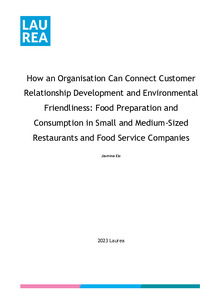How an Organisation Can Connect Customer Relationship Development and Environmental Friendliness: Food Preparation and Consumption in Small and Medium-Sized Restaurants and Food Service Companies
Elo, Jasmina (2023)
Elo, Jasmina
2023
All rights reserved. This publication is copyrighted. You may download, display and print it for Your own personal use. Commercial use is prohibited.
Julkaisun pysyvä osoite on
https://urn.fi/URN:NBN:fi:amk-202303234074
https://urn.fi/URN:NBN:fi:amk-202303234074
Tiivistelmä
If an organisation aims to be successful in the current and future market environment, it cannot ignore environmental sustainability factors or the importance of developing and managing its customer relationships.
This research investigates how small and medium-sized restaurants and food service companies can connect customer relationship development and environmental friendliness. The purpose of this research is to develop a framework that connects customer relationship development and environmentally friendly food preparation and consumption.
The theoretical framework combines existing theory from relationship marketing and environmentally friendly literature from the perspectives of customers and consumption, businesses, and food. The research was conducted using qualitative and constructive research approaches. The research process was conducted via service design methods and tools.
Based on the existing literature and the empirical research, essential items were identified that need to be considered when connecting customer relationship development and environmentally friendly food preparation and consumption in the context of small and medium-sized restaurants and food service companies. These findings include three relationships, four main elements, three questions for an organisation, and answers to those questions. The findings were gathered into a framework which includes two parts: the triangle framework and the rectangle framework. The triangle framework shows the organisation's customer relationship development and environmentally friendly food connection at a high level. The rectangle framework explains the findings in more detail and on a more practical level.
The scientific value of the research is that it broadens the knowledge of the literature on relationship marketing and environmental sustainability. The practical value of the research is that it has developed a framework that is transferable to other industries and is applicable in real life through practical examples.
This research investigates how small and medium-sized restaurants and food service companies can connect customer relationship development and environmental friendliness. The purpose of this research is to develop a framework that connects customer relationship development and environmentally friendly food preparation and consumption.
The theoretical framework combines existing theory from relationship marketing and environmentally friendly literature from the perspectives of customers and consumption, businesses, and food. The research was conducted using qualitative and constructive research approaches. The research process was conducted via service design methods and tools.
Based on the existing literature and the empirical research, essential items were identified that need to be considered when connecting customer relationship development and environmentally friendly food preparation and consumption in the context of small and medium-sized restaurants and food service companies. These findings include three relationships, four main elements, three questions for an organisation, and answers to those questions. The findings were gathered into a framework which includes two parts: the triangle framework and the rectangle framework. The triangle framework shows the organisation's customer relationship development and environmentally friendly food connection at a high level. The rectangle framework explains the findings in more detail and on a more practical level.
The scientific value of the research is that it broadens the knowledge of the literature on relationship marketing and environmental sustainability. The practical value of the research is that it has developed a framework that is transferable to other industries and is applicable in real life through practical examples.
